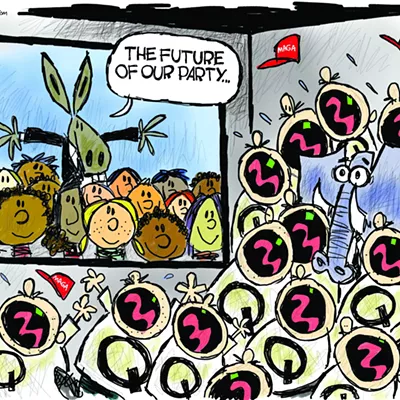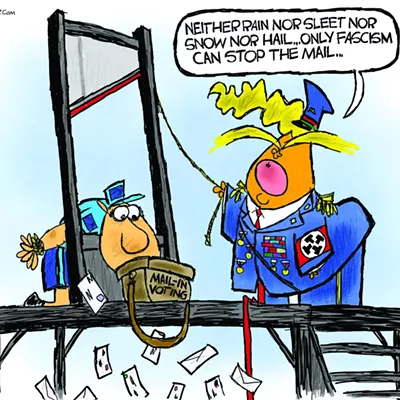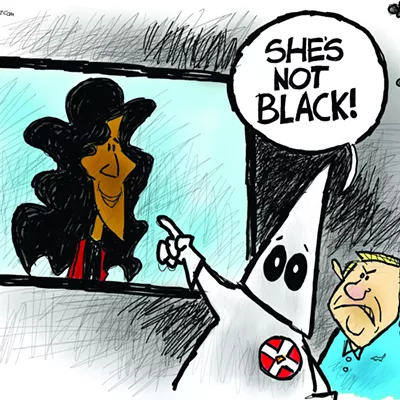District 28, which stretches between I-10 and Camino Seco south of the Rillito River to 22nd Street, has almost 50 percent more Democrats than Republicans. Despite that, Poelstra points to his political experience, constituent service and his chance to be a House committee chair as reasons why voters should support him. Calling himself the district's "strongest voice," he hopes people vote for the person, not the party, on Tuesday, Nov. 5.
Democrats Ted Downing and Dave Bradley disagree. They both doubt that Poelstra, because of his open criticism of his own party's leadership, will be given a position of power in Phoenix. They also plead with people to support them in order to help ensure a "veto-proof" House if Janet Napolitano becomes governor.
On many issues, the three candidates agree. They all want to protect public education from more budget cuts, ensure that health care coverage is affordable and oppose the proposed legislative salary increase. They also unanimously endorse Indian gaming initiative Proposition 202 while backing 203, the medical marijuana measure.
But they do have differences. Downing criticizes Poelstra for voting against a "no-call" telemarketing bill in the last legislative session. In his defense, the incumbent calls the proposed law "seriously flawed" and "horrible," and says it contained a $10,000 fine per call, an amount which could shut down a small business which unknowingly violated its provisions.
Downing also hammers Poelstra and his Republican colleagues for pushing "zero- based budgeting," calling it a ridiculous proposal from the Jimmy Carter era. "Republicans want to micro-manage our lives," the Democrat says, "but they're out of new ideas."
At a recent sparsely attended public forum, as Poelstra and Downing traded some very mild barbs, Bradley remained passively above the fray. "What have you done with your life?" was the question which drove him to seek a House seat, and he wanted to bring his social service and small business experience to the legislature.
Bradley thinks he can get things done in Phoenix by working behind the scenes. But he places blame for the budget crunch squarely on the party in power over the last decade. "The economy goes in cycles, and we should have been saving and investing in the good times. Instead, we have an economic crisis compounded by a policy crisis that is 10 years in the making by the Republicans."
To address the revenue shortfall, Bradley wants to focus on closing tax loopholes along with ending some sales tax exemptions, excluding those for food, health care and prescription drugs. "It won't be pretty," he understands of these ideas in an anti-tax dominated legislature, "but we need common sense approaches."
Downing partially concurs, calling for a moratorium on most sales tax exemptions. He points out that one simple exemption cost Arizona hundreds of teachers last year. Because memberships in health and country clubs don't pay the tax, Downing estimates the state loses $17 million annually. Instead, the Democrat says those funds could pay for 425 teachers at $40,000 a year.
The cause of the budget problem, Downing thinks, was manufactured since 1993 by a shell game played by Republican legislators. "They'll argue this is raising taxes," the candidate says of addressing the issue, "but they have removed through sales tax exemptions $1.8 billion in annual state revenue because lobbyists legally manipulated the system."
While agreeing with his opponents that the state's tax policy does need to be reformed, Poelstra believes the short-term solution must be to tighten the state's purse stings even more. He also promotes joint budget hearings by both House and Senate members as the best way for all elected officials to hear the same information from various state departments.
To balance the budget, Poelstra supports across-the-board cuts, with some exclusions. He thinks K-12 and university education along with certain public safety positions must be spared the fiscal ax next year. On the other hand, Downing and Bradley take a less specific view of possible cuts, talking more about what needs to be saved instead.
While they differ on some things, all three candidates have much in common. Even Ed Poelstra probably shares one of his opponents less optimistic predictions. If he wins the election, "I expect to receive condolence letters from my friends because of the state's budget problems," Dave Bradley chuckles.









